👑 The Great Hittite Rule: Governence with Chariots, Gods, and the Mighty Lion Gate 🐎👑🦁
The adventurous world of the Hittites! 🐎👑 powerful kings racing into battle with chariots, priests keeping the gods happy 🌟, and clever deals with other empires 📜 all for keeping the peace.
GEOGRAPHY STORIES
10/23/20242 min read


Imagine walking into a great ancient city over 3,500 years ago and being greeted by two massive stone lions 🦁, standing tall at the entrance, watching over everything. This was the Lion Gate, the impressive gateway to the Hittite capital of Hattusa. This ancient civilization built this grand entrance to show their strength and power to everyone who visited. But what made the Hittites so powerful, and how did they govern their mighty empire?
At the heart of the Hittite Empire was the king 👑, chosen by the gods , but of course 🌟 to lead the people. The king made important decisions, led the army 🛡️ into battle, and worked to keep peace in the empire. The Lion Gate stood as a symbol of the king’s strength, with its fierce lions guarding the entrance to the city, reminding everyone that the Hittites were not to be messed with!
The king had help, of course. Officials 🧑⚖️ collected taxes from the people, not in money, but in grain, livestock, and other goods 🌾🐄. These taxes were used to build temples 🏛️ and roads 🛣️, keeping the empire connected and strong.
The Hittites were also famous for their clever laws 📜, which helped keep order in their cities. Unlike many other ancient civilizations that relied on harsh physical punishment (like the “eye for an eye” principle in Babylonian law), the Hittites often used fines as punishment. If someone committed a crime like theft or damaging property, they often had to pay a compensation to the victim rather than face severe physical punishment. 🐕: The Hittites even had laws about animals like dogs. If someone injured or killed another person’s dog, they had to pay for it, especially if the dog was important to the household or used for work. If people disagreed or got into trouble, judges ⚖️ would help solve the problems fairly. This kept everyone following the rules and living peacefully.
But the Hittites weren’t just about battles and rules—they were also excellent at making peace 🕊️. If they had conflicts with other kingdoms, like Egypt, they didn’t always fight. Instead, they made peace deals called treaties. One of the most famous treaties was between the Hittites and the Egyptians, and it helped end a long war. They also had mighty Hittite army! They were famous for their fast and powerful chariots 🐎, which helped them defend their land and conquer new territories.
The priests 🛕 were also important in keeping the gods happy. The Hittites believed that by offering prayers and holding ceremonies, they could ensure the gods would protect their empire. What do you think the priests did to keep the gods happy, and why was that important for the empire?” 🛕🌟
Questions to wonder aloud :
“What types of crops and animals do you think were the most important for Hittite farmers?”
“Why do you think the Hittites built temples, and what kinds of ceremonies do you think they held to keep the gods happy?”
“Why do you think the Hittites had so many gods, and how do you think they decided which gods to pray to?”
“What kinds of festivals or celebrations do you think the Hittites had, and how do you think they celebrated important events?”
“What do you think it was like to grow up as a child in the Hittite Empire, and what kinds of games do you think children played?”
With Montessori joy,
Vanina 😊

